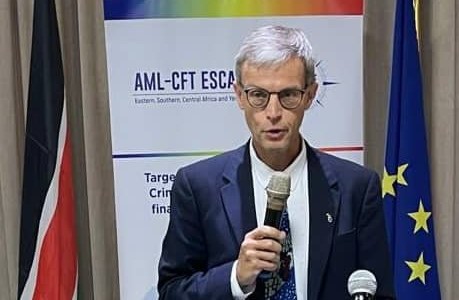The European Union (EU) has reaffirmed its strong commitment to supporting the transition of South Sudan towards a democratic, peaceful and stable country.
The Deputy Head of the EU Delegation in South Sudan, Lothar Jaschke, made the remarks during the opening of a three-day workshop on anti-money laundering, counter terrorism financing, and counter proliferation of weapons of mass destruction in Juba on Monday.
He said the training would contribute to the EU’s overall objective of engagement in South Sudan.
“Money laundering and terrorist financing issues are complex and persistent social, political, security and economic issues that affect all countries and regions, including Europe. Money laundering has a negative impact on security and stability at all levels, strengthens organized crime and has high social costs. Few profit, many pay a high price,” Jaschke said.
He warned that if left unaddressed, money laundering erodes democracy, trust in institutions, the rule of law and human rights and constitutes a key obstacle to development and economic growth. It also increases very tangibly transaction costs and reduces fiscal space.
The EU envoy disclosed that the Financial Action Task Force (FAFT) had grey-listed South Sudan in June 2022 following reports about corrupt practices and the illicit flow of funds and consequently a low ranking in the Transparency International Index.
“Mirroring the FATF decision the European Union regards South Sudan as a jurisdiction that constitutes a threat to its financial interests.
“But there is a way out and we all share the same strong interest to get South Sudan off the grey list, to promote its economic development and to increase an enabling business environment, he explained.
EU has a long record of supporting government’s efforts to tackle anti-money laundering and counter terrorism financing.
This workshop, Jaschke said, provides a unique opportunity to review South Sudan’s progress over the past year and discuss the next steps towards the full implementation of the Action Plan.
On Friday, South Sudan’s government postponed the December 2024 general elections until December 2026, citing a lack of preparedness.
This is the second time the country, which gained independence in 2011, is postponing elections and extending a transitional period that started in February 2020.
The country is going through an economic crisis that has seen civil servants go unpaid for almost one year, after its oil exports were affected by a damaged pipeline amid the civil war in neighbouring Sudan through which it exports.




